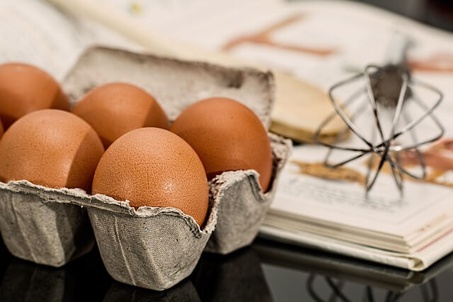Eggs are an excellent source of protein, fat and a variety of other nutrients. They contain choline and antioxidants such as lutein and zeaxanthin.
Do you want a food that is economical, easy to cook and can be used for a variety of preparations? Well, the egg will fulfill all your wishes. Poached, soft or simply beaten, egg makes for a quality meal.
We often ignore it, but if they are of good quality, we could easily eat a dozen eggs a week, provided that the yolk is raw. As for hard-boiled eggs, their consumption should be less frequent even if they are of good quality.
But by the way, what is a quality egg?
The nutrient content of eggs from factory-farmed hens is significantly lower. In addition, eggs laid under such conditions are much more likely to be contaminated with pathogenic bacteria such as salmonella.
Indeed, the quality of the egg is directly dependent on the quality of the rearing conditions of the hen that lays it. If you choose to eat raw eggs, they must be organic and come from free-range hens fed on natural foods.
An egg is considered organic if the chicken is fed exclusively organic feed, that is, grain that has never been near a pesticide or non GMO like GM corn.
Tests have confirmed that "real" free-range eggs are much richer in nutrients.
Quality eggs contain about 6 grams of protein, 60% more vitamin A, 2 times more omega-3, 3 times more vitamin E and 7 times more beta - carotene, which gives the beautiful orange color to quality egg yolk.
Be aware that labels on eggs sold in supermarkets can be misleading, as industry definitions of "freedom" include those of battery hens as long as they move around a bit to feed and get some fresh air... However, regulations do not specify how long animals must spend outdoors, nor how much or how well they must be given outdoor space. Let's remember that some industrial farms house tens of thousands of hens, even hundreds of thousands of hens.

Pasture-raised hens are hens that roam freely outdoors on grass or dirt and feed themselves by foraging for what is suitable for them in nature: seeds, grasses, plants, insects, vermin and worms. It is this type of hen only that lays the real farm eggs.
Ideally, of course, you should buy your eggs from a local farmer you know.
A sign of quality that does not deceive... the saffron yellow
You know that beautiful color of the saffron yolk of the egg, it reflects its beta-carotene content. A pale, dull yellow does not bode well... A hen that pecks in the wild will produce eggs with a yellow color close to bright orange.
Avoid all eggs that are "rich" or "enriched with omega-3". They usually come from chickens fed on feed that contains poor quality omega-3 fatty acids, which are often already oxidized. Rich eggs have a much shorter shelf life.
Eggs are great for your heart health
There is a misconception that eggs are rich in saturated fats and therefore bad for the heart, but this is not the case. Numerous studies have proven that eating more than 6 eggs per week has no harmful consequences on the cardiovascular system, nor on the cholesterol. Nor do they increase the risk of hypertension, heart attack, stroke, etc. It even seems that certain cooked gastrointestinal enzymes convert certain proteins into peptides that act to lower blood pressure.
So there's plenty of evidence that eggs are among the healthiest foods and an almost ideal source of energy for most of us.
If you eat a lot of them in order to benefit from their health advantages, ideally the yolks should be kept raw. As with all foods, heat damages most of the nutrients with antioxidant and protective properties. These properties would be reduced by half when eggs are cooked, scrambled, or hardboiled. Not to mention that they lose their "cholesterol-lowering" power as a result of the temperatures to which the eggs are subjected.



